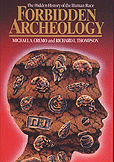

HARDCOVER VERSION $44.95
Shipping via book rate $3.10, priority mail $7.55
CONDENSED VERSION $22.95
Shipping via book rate $1.75, priority mail $3.95
Method of payment: Check or Money order, VISA, Master.
(Above rates US orders only. Foreign orders, please call or
write.)
THE AUTHORS
Michael A. Cremo is a research associate of the Bhaktivedanta Institute, specializing in the history and philosophy of science.
Dr. Richard L. Thompson, a founding member of the Bhaktivedanta Institute, received his Ph.D. in mathematics from Cornell University. He is the author of books and articles on mathematical evolutionary biology.
From the Inside Cover
FORBIDDEN ARCHEOLOGY
The Hidden History of the Human Race
MICHAEL A. CREMO AND
RICHARD L. THOMPSON
In the years since Charles Darwin published The Origin of Species, scientists have advanced various evolutionary accounts of human origins. According to the most current version, human beings like ourselves, Homo sapiens sapiens, originated in Africa, about 100,000 years ago. But in Forbidden Archeology, Michael A. Cremo and Richard Thompson bring to light abundant evidence that demonstrates the existence of anatomically modern humans in the far more distant past.
Over the past century and a half, say Cremo and Thompson, scientists the world over have uncovered cultural artifacts and human skeletal remains showing that people like ourselves have lived for millions of years on this planet. But few today have heard of this evidence. It has been ignored, suppressed, or forgotten, simply because it does not fit the now dominant view of human origins and antiquity.
In effect, evolutionary ideas, deeply held by powerful groups of scientists, have acted as what Cremo and Thompson characterize as a "knowledge filter." And the process of knowledge filtration has left us with a radically incomplete collection of facts upon which to base our ideas of human origins.
In Forbidden Archeology, we accompany the authors on a fascinating intellectual expedition. We take part with them in the literary excavation of a vast store of hidden knowledge that adds a new dimension to our understanding of the history of our species.
This journey of exploration takes us to key archeological sites on five continents--some long forgotten, some the center of ongoing research. Along the way, we shall meet an intriquing cast of characters, all with secrets to share.
Forbidden Archeology is bound to inspire controversy, challenging as it does one of the most fundamental components of the modern scientific world view. Carefully researched and written, it is one of the most important books of our time.
The Bhaktivedanta Institute, founded in 1975, is a center dedicated to the advanced study of the nature and origin of life and the universe in light of ancient India's Vedic literature.
"Forbidden Archeology is a remarkably complete review of the scientific evidence concerning human origins. It carefully evaluates all the evidence, including the evidence that has been ignored because it does not fit the dominant paradigm. Anyone can learn a great deal from the authors' meticulous research and analysis, whatever one concludes about their thesis regarding the antiquity of human beings."
Dr. Phillip E. Johnson
University of California, Berkeley
Author of Darwin on Trial
"I perceive in Forbidden Archeology an important work of thoroughgoing scholarship and intellectual adventure. Forbidden Archeology ascends and descends into the realms of the human construction of scientific 'fact' and theory: postmodern territories that historians, philosophers, and sociologists of scientific knowledge are investigating with increasing frequency....With exacting research into the history of paleoanthropological discovery, Cremo and Thompson zoom in on the epistemological crisis of the human fossil record, the process of disciplinary suppression, and the situated scientific handling of 'anomalous evidence' to build persuasive theory and local institutions of knowledge and power."
Dr. Pierce J. Flynn
Department of Arts and Sciences
California State University, San Marcos